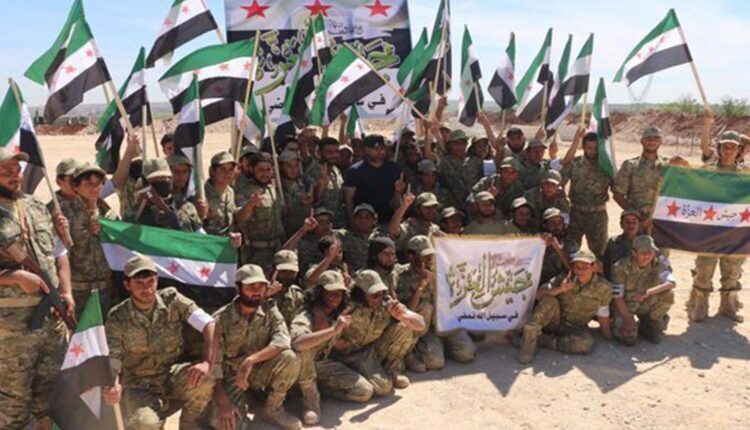This would completely reshuffle the political landscape in Syria. A week after remarks by the Turkish Foreign Minister Mevlut Cavusoglu about Turkey “providing political support to Syria” if it decides to confront “terrorism,” meaning the Syrian Democratic Forces, Russian and Turkish media platforms are speculating that a phone call between Assad and Erdogan could happen anytime.
Russian suggestion
According to the pro-government newspaper Athr Press, a Turkish newspaper sparked controversy after publishing a story regarding the possibility of that phone call between President Bashar al-Assad and Turkish President Recep Tayyip Erdogan. The Turkish newspaper said that it was the suggestion of Russian President Vladimir Putin. It added that Putin even invited the parties to meet for discussions. In parallel, according to the opposition website Syria TV, Turkey’s six-party opposition coalition is seeking consensus amongst its members to open channels for dialogue with the Syrian regime to resolve the issue of Syrian refugees in Turkey. Earlier, during a summit in the Russian city of Sotchi, Putin and Erdogan had agreed on working together in Syria and Libya, conflict areas where they have backed opposing sides, the Kurdish agency North Press reports. It added, however, that Putin did not give Erdogan the green light to invade Northern Syria.
Opposition worried
These developments have worried the Turkish-backed Syrian opposition. In fact, a large faction, the Ahrar al-Sharqiya, withdrew its members from the joint checkpoints as they fear a rapprochement between Ankara and Damascus, according to North Press. It suspended its contact with the Turkish forces in the aftermath of the recent statements regarding rapprochement between Turkey and the Syrian government, according to a source. The source added that “What the Ahrar al-Sharqiya has done is an introduction to steps that could reshuffle the situation and complicate the relationship between the factions and the guarantor.”
Mustafa Bakour, the spokesperson of Jaysh al-Izza (Army of Glory) told North Press that al-Fateh al-Mubin Operations Room refused any convergence with the “Assad regime,” referring to the Turkish guarantor.
“Within the framework of the al-Fateh al-Mubin Operations Room, (which includes Hay’at Tahrir al-Sham (HTS), Jaysh al-Izza and other opposition factions operating in Idleb), we are following the news reports on a possible convergence between Turkey and al-Assad Regime,” Bakour added.
He pointed out that “The media exaggeration that is taking place aims to affect the morale of the popular incubator of the Syrian revolution and the military factions, ruling out that the idea of convergence between the two states is serious.”
Bakour indicated that “A unified position of the factions could contribute to influencing the Turkish position, especially since the factions refuse any convergence with the Assad regime from any side.”
Turkish intellectuals criticize the planned operation
According to the opposition agency Sham Times, a total of 308 Turkish intellectuals — including academics, journalists, writers, and civil society representatives — have issued a joint statement calling on the Turkish opposition to act and prevent a potential military operation in Syria.
The statement condemned the military operation in the Kurdistan Region of Iraq, noting that the possible military operation in Syria lacks any correct justification. The statement considered that rhetoric about “an enemy threatening Turkey from inside Syria” is a fictitious argument, invented by the ruling coalition.
Referring to President Recep Tayyip Erdogan’s statements that he wants to carry out a military operation in northern Syria to establish a “safe zone” 30 km deep, the statement explained that the targeted area is inhabited by people who are defending their occupied territories, rights and property, suffering great pains and being killed in the process.
The statement stressed that the potential military operation would benefit no one but the ruling authority and that this military operation would cause great harm to the rest of the Turkish people. The statement added: “Young people who are forced to fight and kill people in foreign lands, and martyrs who will fall in battle, will do so to ensure the ruling authority’s survival and not for the homeland’s sake.”
The statement added that spending huge amounts of money on weapons and other wartime costs in a country where millions of citizens live under the poverty line and face great difficulties in all respects — including food, housing, children’s education, and health — will exacerbate the economic problems facing the country’s citizens and everyday challenges.
The statement denounced the failure of the opposition six-party alliance to take a firm position on the issue. It stressed that the failure to show a firm position towards the regime’s policy will make the opposition “complicit in the spilled blood and the crimes committed against humanity, Turkey, and its people.”
The statement called on opposition parties “not to be complicit in any of the crimes of the ruling authority and to participate in that war, by preventing the passage of this from parliament.”


